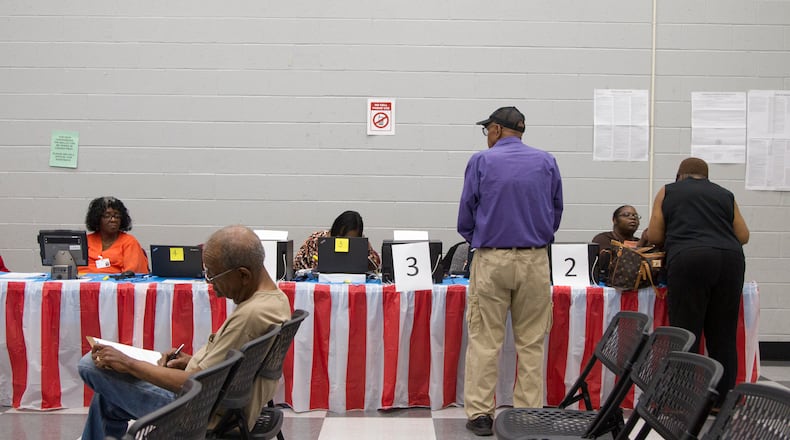The upcoming general election in Georgia will be "plunged into chaos" if a federal judge grants a request to immediately switch the state to paper ballots, according to attorneys for Secretary of State Brian Kemp.
The court filing Tuesday came in response to a lawsuit that is trying to prevent Georgia from using its 27,000 touchscreen voting machines, which the plaintiffs say are vulnerable to hacking.
But imposing paper ballots less than three months before the Nov. 6 election would create more problems than it would solve, according to the attorneys for Kemp, former Democratic Gov. Roy Barnes and John Salter. Kemp is a Republican candidate for governor against Democrat Stacey Abrams.
“There is no ‘paper-ballot fairy’ who, with magic wand at ready, can save plaintiffs’ half-baked ‘plans’ from devolving into a fiasco,” according to their response.
Requiring paper ballots would cost more than $13.4 million and lead to voter confusion, increased wait times, suppressed turnout and potential disenfranchisement, according to the state’s filing.
“A theoretical possibility that a voting machine somewhere might be susceptible to tampering is outweighed by the state’s legitimate interest in protecting its elections from the mad scramble that would certainly ensue if the plaintiffs’ motions were granted,” the state’s filing said.
The plaintiffs in the case, which include voting integrity organizations and individual voters, have said Georgia’s direct-recording electronic (DRE) voting system needs to be scrapped immediately.
Some of the plaintiffs are asking U.S. District Judge Amy Totenberg to issue an injunction that would require all of Georgia’s 6.7 million registered voters to be mailed paper absentee ballots, and to have a supply of paper ballots at each polling place on Election Day. Another plaintiff, the Coalition for Good Governance, is seeking to make paper ballots available at precincts without imposing the additional cost of mailing absentee ballots.
“Plaintiffs’ right to vote is under attack,” according to an Aug. 7 memo seeking a preliminary injunction. “Georgia’s DREs are highly vulnerable to numerous types of attacks from both sophisticated and even unsophisticated actors.”
There’s no evidence that hackers have penetrated Georgia’s election systems, but election integrity advocates say the risk is there, and officials wouldn’t necessarily know whether results had been changed without a verifiable paper backup.
A commission formed by Kemp is evaluating options for a replacement voting system that would be in place in time for the 2020 presidential primary. Kemp has said Georgia's 16-year-old voting system is safe but needs to be updated.
About the Author
Keep Reading
The Latest
Featured




